Gallery of Fresh Water
Disclaimer: This material is being kept online for historical purposes. Though accurate at the time of publication, it is no longer being updated. The page may contain broken links or outdated information, and parts may not function in current web browsers.
Gallery of Fresh Water
-
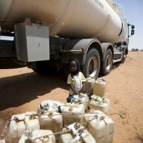 Distribution of drinking water in North Darfur. Millions of people around the world do not have access to clean drinking water.
Photo credit: UN Photo/Albert Gonzalez Farran.
Distribution of drinking water in North Darfur. Millions of people around the world do not have access to clean drinking water.
Photo credit: UN Photo/Albert Gonzalez Farran.
-
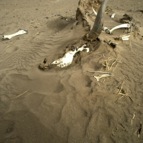 A partially buried skeleton in the drought-affected region of St. Louis, Senegal.
Photograph by R B Reed.
A partially buried skeleton in the drought-affected region of St. Louis, Senegal.
Photograph by R B Reed.
-
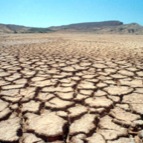 This cracked earth in Senegal is created by a lack of water and intense heat. Photo credit: UN Photo/Evan
This cracked earth in Senegal is created by a lack of water and intense heat. Photo credit: UN Photo/Evan
-
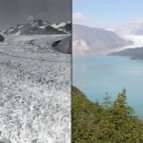 The Muir Glacier in Alaska in 1941 (left) and 2004 (right). Global warming has caused much of this glacier to melt.
Photo credit: Glacier Photograph Collection, National Snow and Ice Data Center/World Data Center for Glaciology.
The Muir Glacier in Alaska in 1941 (left) and 2004 (right). Global warming has caused much of this glacier to melt.
Photo credit: Glacier Photograph Collection, National Snow and Ice Data Center/World Data Center for Glaciology.
-
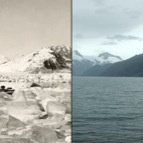 A glacier in Alaska in 1940 (left) and 2005 (right). Global warming has caused much of this glacier to melt.
Photo credit: 2005 photo taken by Bruce F. Molnia. Courtesy of the Glacier Photograph Collection, National Snow and Ice Data Center/World Data Center for Glaciology..
A glacier in Alaska in 1940 (left) and 2005 (right). Global warming has caused much of this glacier to melt.
Photo credit: 2005 photo taken by Bruce F. Molnia. Courtesy of the Glacier Photograph Collection, National Snow and Ice Data Center/World Data Center for Glaciology..
-
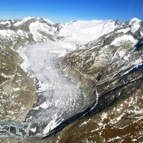 A glacier in Switzerland. Global warming has caused many glaciers to shrink.
Photo credit: UN Photo/Jean-Marc Ferre.
A glacier in Switzerland. Global warming has caused many glaciers to shrink.
Photo credit: UN Photo/Jean-Marc Ferre.
-
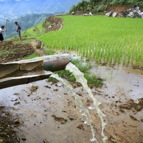 A rice field in Vietnam. Growing rice requires a huge amount of fresh (non-salty) water.
Photo credit: UN Photo/Kibae Park.
A rice field in Vietnam. Growing rice requires a huge amount of fresh (non-salty) water.
Photo credit: UN Photo/Kibae Park.
-
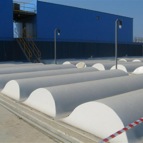 Seawater flows through these giant tanks of sand in a process that converts it to fresh drinking water.
Photograph by Dima Sasyl.
Seawater flows through these giant tanks of sand in a process that converts it to fresh drinking water.
Photograph by Dima Sasyl.
-
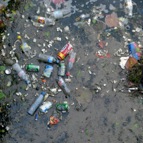 A bird’s nest is surrounded by trash-filled water.
A bird’s nest is surrounded by trash-filled water.
-
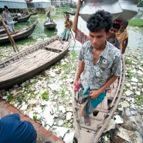 Contaminated water in Dhaka, Bangladesh. Pollution can poison drinking water and create major health problems.
Photo credit: UN Photo/Kibae Park.
Contaminated water in Dhaka, Bangladesh. Pollution can poison drinking water and create major health problems.
Photo credit: UN Photo/Kibae Park.
-
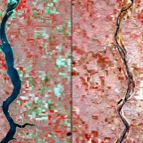 The Missouri River during normal conditions (left) and in severe drought (right).
Photo credit: NASA/GSFC/METI/Japan Space Systems and the U.S./Japan ASTER Science Team.
The Missouri River during normal conditions (left) and in severe drought (right).
Photo credit: NASA/GSFC/METI/Japan Space Systems and the U.S./Japan ASTER Science Team.
-
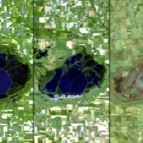 The Cheyenne Bottoms Wildlife Wetlands in Kansas, shown from 2010 (left) to 2012 (right), has suffered severe drought.
Photo credit: U.S. Department of the Interior / USGS and NASA.
The Cheyenne Bottoms Wildlife Wetlands in Kansas, shown from 2010 (left) to 2012 (right), has suffered severe drought.
Photo credit: U.S. Department of the Interior / USGS and NASA.












